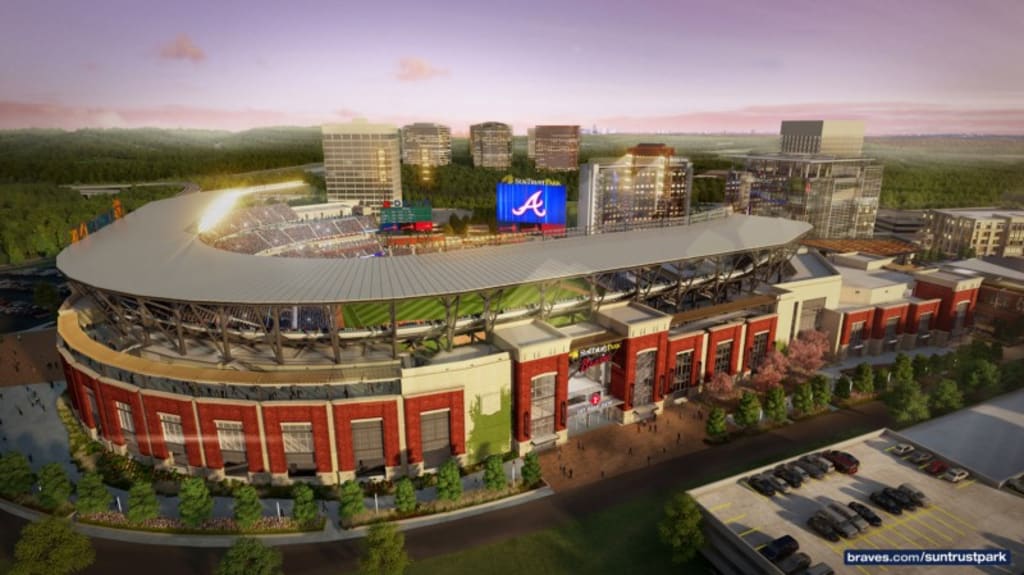Pay For Your Own Damn Stadium
Owners should foot the bill for new stadiums, not taxpayers.

In 2017, with much fanfare, pomp, and circumstance, no fewer than three major league Atlanta sports teams will receive new stadiums. The Atlanta Braves will move north from Turner field into SunTrust Park, and the Falcons and the newly-formed Atlanta United FC will move into the aperture-esque Mercedes-Benz Stadium.
And as is the case with many new sports stadiums, taxpayers are footing the bill for both. According to the Atlanta Journal-Constitution, the tax-free bonds used to fund Mercedes-Benz Stadium cost taxpayers $36 million. SunTrust Park was even more of a swindle, where Cobb County raised property taxes to get money for public parks only to have a substantial portion of the money diverted to pay for the Braves’ new home.
The backhanded manner in which the Falcons and Braves obtained money for their new parks was a slap in the face of taxpayers — but it’s nothing new. According to a study from the Brookings Economic Institute, 36 different sports teams financed new stadiums using tax-exempt bonds from 2000 to 2014, not including Mercedes Benz stadium. That study estimated that the total loss of revenue to the US government was nearly $3.7 billion.
Why does the federal government (and by proxy, taxpayers) lose money on these investments? When bonds are issued as tax free, the interest earned on said bonds isn’t considered a taxable form of income by the federal government. If the bonds had been issued as taxable, the government might have made $3.7 billion, but instead, that money is effectively subsidized by the teams in order to build the stadium.
These types of federal subsidies mean that the cost of new stadiums are spread nationwide — all taxpayers end up paying for new stadiums, regardless of whether or not they live anywhere near the stadium (or even cheer for the team).
When used as intended, the tax free bonds can be used to promote the public good — perhaps the bonds would be issued to create a public park. Instead, counties are abusing the bonds to give subsidies to private organizations, such as sports teams. As a result, fans pay twice to see a game — once at the gate, and again on their tax forms.
So why allow these subsidies to continue? Politicians defend the subsidies, claiming that new stadiums bring jobs, visitors, and prestige to municipalities. In reality, rarely is there a substantial impact on a city’s economy resulting from a new stadium: construction jobs are only temporary and stadium related jobs, such as ushers or vendors, are largely part-time positions. Stadiums may help draw more visitors, but hotels find their profits offset by hotel taxes — often levied to help pay for the stadium. And prestige is a nebulous buzzword with no measurable economic value.
The fact of the matter is, many teams have the capital necessary to build their own stadiums. Stan Kroenke, owner of the LA Rams, is largely using private funding to construct the Rams’ new stadium, with a minimal impact on taxpayers. The 49ers stadium, Levi’s Stadium, was funded similarly. There are some teams who are in dire financial straights and in need of a new stadium, but why should the public be forced to pay for their loans? Private loans would limit the burden on taxpayers.
Despite the economic burden on taxpayers, it’s unlikely that the usage of tax free municipal bonds for the construction of private stadiums will cease soon. Obama had previously attempted to cut the loophole in his 2016 budget proposal, but a Republican congress rejected the measure. Now, in a Trump administration whose economic policy appears to be built around giving private entities large and expensive subsidies, it’s unlikely that this method of stadium financing will be lifted in the near future.
There’s unlikely to be any change at the municipal level either. Local politicians would love to parrot about attracting new business in the form of a franchise, or claim to be the savior of sports in their town, despite the fact that, again, publicly funded stadiums don’t help local economies.
This is especially the case at the minor league level, where franchises like the Braves pull out the red carpet for local officials to convince them to fund minor league stadiums and ignore how shoddy the economics behind building publicly subsidized stadiums actually are.
In bigger cities, this tide may be turning. For instance, fewer and fewer global cities are bidding for Olympics — principally because of the exorbitant costs of construction without benefit. In the past, few cities have profited from the Olympic Games, and some have almost bankrupted the cities or countries in which they were hosted.
The biggest exception to the rule of “lose a whole lot of money in front of the entire world” was the 1984 Olympics in Los Angeles. The difference between these games and others were that the LA Olympics were not funded by the government. The organizers instead worked with a lower budget than other Olympics, upgraded stadiums instead of building new ones, and cut corporate deals. The result was an incredibly successful Olympic Games — all at minimal cost to taxpayers.
Sports teams don’t need to stay in the same rotting stadiums forever — successfully upgrading old stadiums or building new ones is completely feasible. But the notion that public funds are, a) necessary and b) a good investment, is ludicrous. The Braves should be playing with bats and balls, not with taxpayer dollars.
About the Creator
John Edwards
Staff Writer for The Unbalanced, Contributor at Sporting News.






Comments
There are no comments for this story
Be the first to respond and start the conversation.